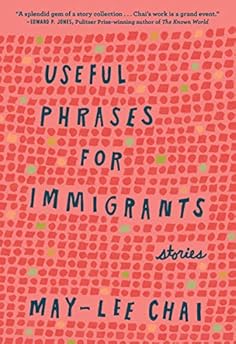« older | Main Largehearted Boy Page | newer »
October 24, 2018
May-lee Chai's Playlist for Her Story Collection "Useful Phrases for Immigrants"
In the Book Notes series, authors create and discuss a music playlist that relates in some way to their recently published book.
Previous contributors include Jesmyn Ward, Lauren Groff, Bret Easton Ellis, Celeste Ng, T.C. Boyle, Dana Spiotta, Amy Bloom, Aimee Bender, Heidi Julavits, Hari Kunzru, and many others.
May-lee Chai's brilliant Useful Phrases for Immigrants is one of the year's finest short story collections.
Booklist wrote of the book:
"With her masterful short story collection, Chai proves with exquisite craftsmanship that less can be so much more. The eight stories making up this slim volume focus on characters trying to make sense of changing literal and metaphorical landscapes."
In her own words, here is May-lee Chai's Book Notes music playlist for her story collection Useful Phrases for Immigrants:
1) Useful Phrases for Immigrants
At its core, Useful Phrases for Immigrants is a kind of love story--there's multiple kinds of love here as well as anxiety about love and being loved and finding strength in love. So I thought Faye Wong's classic "Hong Dou 紅豆," which has such an air of wistfulness and longing, fits the themes so well.
2) Fish Boy
The protagonist in "Fish Boy" (if he were real) would most likely be listening to American rap in 2002 when the story is taking place as he tries to figure out how to survive in the big city when you're poor and the odds against you. To accompany this story I picked a song by contemporary Chinese rap artist Ty. The official English title is "Street Smarts" but the literal translation of the Chinese title is "Didn't Do Well in School" and it depicts the frustration that many students feel about the uselessness of their exam-based, memorization-based school curriculum.
Ty. (featuring Cyndi Wang)
"Shu Mei Du Hao" 書沒讀好 ("Street Smarts")
3) The Body
The short story "The Body" was inspired in part by the Ming Dynasty Chinese play from 1598 "The Peony Pavilion" by Tang Xianzu. I've seen several adaptions over the years, including the masterful opera that premiered at Zellerbach Hall at UC Berkeley in 1998, directed by Peter Sellars. It featured a rock-jazz-kunqu opera-fusion score by Tan Dun, who would later go on to fame for his Oscar-winning score for Crouching Tiger, Hidden Dragon. In the original play, a young scholar stops at a pavilion and is visited by a ghost of a young woman who had died while pining for a lover whom she could see only in her dreams. Traditionally the two lovers--young man and ghost--are always from the elite, upper classes of society. I wondered what would happen if instead the lovers were poor, migrant workers in 21st century China? What does it mean--for society, for them-- that they could only encounter each other once one was already dead?
I've chosen a track from Tan Dun's Bitter Love soundtrack, the fusion score that he composed for the Peony Pavilion retelling.
"Against Time of Desire" (sung by Ying Huang)
4) Canada
In this story, a young Chinese American girl in New Jersey, obsessed with Nancy Drew mysteries, is looking for clues to what makes her parents argue, and what it means to be growing up female and why everyone --from her school to her friends to her family--seems to have different and conflicting ideas about what that means.
I think Awkwafina's "NYC Bitche$" would have appealed to the protagonist.
5) Ghost Festivals
For this story of longing and societal prejudice, I thought Grace Chang's classic "I Want Your Love (我要 你的愛) played on the characters' desire for love very well. The song was also famously featured in Ts'ai Ming-liang's apocalyptic musical, The Hole (2000), about characters having to overcome great obstacles in their quest for human connection.
6) The Lucky Day
In this story, a prodigal daughter returns to help her mother, who is in the final stages of cancer. While the daughter was hoping for acknowledgement from her mother, the mother has an entirely different idea of how they should spend their time together. I felt Cyndi Lauper's anthem, "Girls Just Wanna Have Fun," ultimately captured the spirit of the story.
7) First Carvel in Beijing
Ultimately this is a story about forgiveness, about letting go of the past, and accepting one's self. So Faye Wong's beautiful rendition of the Heart Sutra felt like a match.
8) Shouting Means I Love You
The father and daughter in this story argue (albeit humorously) about gentrification, family, who loved whom more, and many, many other things, so I thought Cui Jian's classic rock anthem "I Have Nothing 一無所有" fit their mood.
"Yi wu suo you"
May-lee Chai and Useful Phrases for Immigrants links:
the author's website
the author's Wikipedia entry
Booklist review
Foreword review
Kirkus review
Publishers Weekly review
Poets & Writers interview with the author
also at Largehearted Boy:
Support the Largehearted Boy website
Book Notes (2015 - ) (authors create music playlists for their book)
Book Notes (2012 - 2014) (authors create music playlists for their book)
Book Notes (2005 - 2011) (authors create music playlists for their book)
my 11 favorite Book Notes playlist essays
Antiheroines (interviews with up and coming female comics artists)
Atomic Books Comics Preview (weekly comics highlights)
guest book reviews
Librairie Drawn & Quarterly Books of the Week (recommended new books, magazines, and comics)
musician/author interviews
Note Books (musicians discuss literature)
Short Cuts (writers pair a song with their short story or essay)
Shorties (daily music, literature, and pop culture links)
Soundtracked (composers and directors discuss their film's soundtracks)
weekly music release lists






